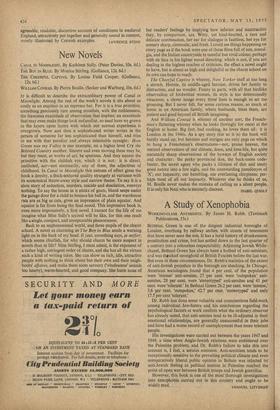New Novels
WILLIAM CONRAD. By Pierre Boulle. (Seeker and Warburg, 10s. 6d.)
IT is difficult to describe the extraordinary power of Canal in Moonlight. Among the rest of the week's novels it sits about as cosily as an esquimo in an espresso bar. For it is a true primitive, something preciously rare among novelists, with the ruthlessness, the ferocious exactitude of observation that implies; an exactitude that may even make things look unfamiliar, so used have we grown to the layers upon layers with which our normal experience is overgrown. Now and then a sophisticated writer writes in the person of someone far less sophisticated than himself, and tries to see with that peculiar and always inimitable eyesight : How Green was my Valley is one example; on a higher level Cry the Beloved Country another. Sincere and even moving these may be, but they must, as works of art; be spurious. And they equate the primitive with the childish eye, which it is not: it is direct, undiluted, net—not necessarily, any of them, the adjectives of childhood. In Canal in Moonlight this netness of effect gives the book a density, a thick-textured quality strangely at variance with its economical throw-away style and narrow theme. To say it is a slum story of seduction, murders, suicide and desolation, conveys nothing. To say the house in it stinks of goats, blood seeps under the garage door for a child to bounce his ball in, and the warehouse rats are as big as cats, gives an impression of plain squalor. And squalor is far from being the final mood. This impressive book is, even more impressively, a first novel. I cannot for the life of me imagine what Miss Sully's second will be like, for this one reads like a single, compact, and unrepeatable phenomenon.
Back to an unphenomenal world, and three pupils of the charm school. A novel as charming as The Boy in Blue sends a warning light on in the back of my head. 11 Taut, something says, se meter; which seems churlish, for why should charm be more suspect in novels than in life? Miss Stirling, I must admit, is the exponent of a rather high, astringent order of charm, and she has all the virtues such a kind of writing takes. She can show us rich, idle, attractive people with nothing to think about but their own and their neigh- botirs' aflaires, and make them seem savoury ('wholesome' sounds too hearty), warm-hearted, and good company. She hurts none of her readers' feelings by implying how inferior and unattractive they, by comparison, are. Witty, yet kind-hearted, a rare and delicate combination, her ear for dialogue is faultless, her eye for scenery sharp, cinematic, and fresh. I could see things happening on every page as if the book were one of those films full of sun, nostal- gia, and the Italian countryside in tasteful but vivid colour, perhaps with de Sica in his lighter mood directing; which is not, if you arc dealing in the highest reaches of criticism, the effect a novel ought to have, but is about as high and delightful as the charm school on its own can hope to reach.
The Cheerful Captive is whimsy, New Yorker stuff at too long a stretch. Hennie, its middle-aged heroine, drives her family to distraction, and no wonder. Funny in parts, with all that birdlike observation of birdwitted women, its style is too determinedly vivacious; a clever image every three lines is enough to set me groaning. But I never felt, for some curious reason, so much at home in an American family, where husbands, bless them, are patient and good beyond all British imagining.
And William Conrad is whimsy of another sort, the French- man's flattering whimsy when he looks (lovingly for once) at the English at home. Big feet, bad cooking, he loves them all : it is London in the 1940s. As a spy story (for so it is) the book will hardly stand up; but heroism and intrigue arc only pegs on which to hang a Frenchman's observations—not, praise heaven, the normal observations of our climate, dress, and love-life, but quite uncannily sharp observations of the byways of English society and character : the perky provincial don, the back-room code- buster, the secret agent who packs a lifetime of dim and steely good nature into a few sighs, and the unrewarding pseudonym of 'X'; our loquacity, our bumbling, our everlasting chirpiness; per- haps most of all our loquacity. Whatever else he thinks of us, M. Boulle never makes the mistake of calling us a silent people.


































 Previous page
Previous page